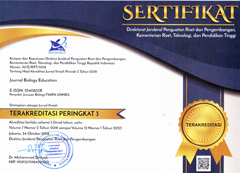HUBUNGAN ANTARA EMOTIONAL QUOTIENT (EQ) DENGAN TIGA DOMAIN HASIL BELAJAR SISWA PADA MATERI PENGELOLAAN LINGKUNGAN
Abstract
Â
Abstrak
___________________________________________________________________
Pada proses pembelajaran di sekolah masih ditemui siswa yang tidak dapat meraih hasil belajar yang setara dengan kemampuan inteligensinya. Ada sekitar 20% siswa yang mempunyai kemampuan inteligensi tinggi tetapi memperoleh hasil belajar yang relatif rendah, serta ada pula siswa yang walaupun kemampuan inteligensinya relatif rendah namun dapat mengelola emosi dan berkomunikasi dengan baik sehingga dapat meraih hasil belajar yang relatif tinggi. Oleh sebab itu, dalam proses belajar siswa keseimbangan antara kecerdasan inteligensi, emosional dan spiritual sangat diperlukan. Penelitian ini bertujuan untuk mengetahui apakah ada hubungan antara Emotional Quotient(EQ) dengan hasil belajar siswa domain kognitif, afektif dan psikomotor pada materi pengelolaan lingkungan. Penelitian ini adalah penelitian korelasional. Populasi dalam penelitian ini adalah siswa kelas VII SMP Negeri 29 Semarang dan sampel yang digunakan adalah 71 siswa yang diambil dengan teknik proporsional random sampling. Data diambil dengan instrumen angket kuesioner, tes dan praktikum untuk kemudian dianalisis dengan uji korelasi. Hasil dari uji korelasi menunjukkan bahwa hubungan antara Emotional Quotient(EQ) dengan hasil belajar siswa domain kognitif yaitu dengan koefisien korelasi 0,336, hasil belajar siswa domain afektif dengan koefisien korelasi 0,556 serta hasil belajar psikomotor dengan koefisien korelasi 0,381 sehingga menunjukkan ada hubungan antara Emotional Quotient (EQ) dengan tiga domain hasil belajar siswa pada materi pengelolaan lingkungan. Hal ini berarti bahwa semakin tinggiEmotional Quotient (EQ), maka akan semakin baik pula hasil belajar kognitif, afektif dan psikomotor siswa pada materi pengelolaan lingkungan.
Â
Abstract
_________________________________________________________________
Process of teaching and learning in schools still found students who can not achieve the learning outcomes equivalent with intelligence capabilities. There are 20% students who have high intelligence capability but gain relatively low learning outcomes, also there are students who despite his intelligence capability is relatively low but can manage emotions and communicate well so can achieve a relatively high learning outcomes. Therefore, in the students learning process the balance between intellect intelligence, emotional and spiritual indispensable. The aim of the study is to determine whether there is a relationship between Emotional Quotient (EQ​​) with the student learning outcomes domains of cognitive, affective and psychomotor on material environmental management. This study is a correlation study. The population in this study is VII grader student of 29 Junior High Shool in Semarang and the sample used is 71 students were taken to the proportional random sampling technique. Data taken with a questionnaire instrument, tests and experiment for later analysis with correlation. The results of correlation test showed that there is a relationship between Emotional Quotient (EQ​​) with student learning outcomes, namely cognitive domains with a correlation coefficient 0.336, the affective domain of student learning outcomes with a correlation coefficient of 0.556 and also psychomotor learning outcomes with a correlation coefficient of 0.381 indicating have relationship between Emotional Quotient ( EQ) with three domains of student learning outcomes in environmental management material. This means that the higher Emotional Quotient (EQ​​), the learning outcomes of cognitive, affective and psychomotor on material environmental management will be better.
References
Dimyati & Mudjiono. 2009. Belajar dan Pembelajaran. Jakarta: Rineka Cipta.
Festus AB. 2012. The Relationship between Emotional Intelligence and Academic Achievement of Senior Secondary School Students in the Federal Capital Territory, Abuja. Journal of Education and Practice 3 (10): 13-19.
Godarzi F. 2013. The Relationship between Emotional Quotient (EQ) and Parents and Responsibility of Students. J. Basic. Appl. Sci. Res. 3(2): 1105-1114.
Goleman D. 2001. Kecerdasan Emosi untuk Mencapai Prestasi. Jakarta: PT Gramedia Pustaka Utama.
Kutash K. 2000. The School and Community Study: Characteristics of Students Who Have Emotional and Behavioral Disabilities Served in Restructuring Public Schools. Journal of Child and Family Studies 9 (2): 175–190.
Lewis NJ et al. 2005. Emotional Intelligence in Medical Education: Measuring the Unmeasurable?. Advances in Health Sciences Education (10):339–355.
Nggermanto A. 2001. Quantum Quotient. Bandung: Nuansa.
Nurdin. 2009. Pengaruh Kecerdasan Emosional terhadap Penyesuaian Sosial Siswa di Sekolah. Jurnal Administrasi Pendidikan 9 (1): 86-108.
Sumayku J. 2011. Hubungan Kreativitas dan Sikap Siswa dalam Proses Pembelajaran dengan Pencapaian Prestasi Belajar pada Jurusan Listrik di SMK Negeri 2 Bitung. Ed Vokasi Jurnal Pendidikan Teknologi dan Kejuruan 2 (2): 23-27.
Tirtarahardja U & L Sulo. 2005. Pengantar Pendidikan. Jakarta: Rineka Cipta.
Vandervoort DJ. 2006. The Importance of Emotional Intelligence in Higher Education. Current Psychology: Developmental, Learning Personality, Social Spring 25 (1): 4-7.
Widoyoko EP. 2010. Evaluasi Program Pembelajaran. Yogyakarta: Pustaka Pelajar.
Zulhelmi. 2009. Penilaian Psikomotor dan Respon Siswa dalam Pembelajaran Sains Fisika melalui Penerapan Penemuan Terbimbing di SMP Negeri 20 Pekanbaru. Jurnal Geliga Sains 3 (2): 8-13.
The copyright of the article once it is accepted for publication shall be assigned to the journal as the publisher. The intended copyright includes the right to publish the article in various forms (including reprints). The journal maintains the publishing rights to the published articles.
This work is licensed under a Creative Commons Attribution 4.0 International License.







